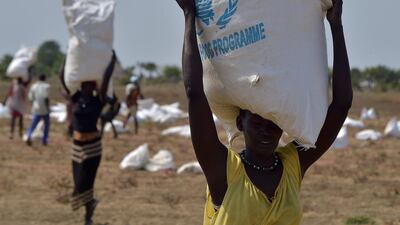A woman in a black and white dress stood with a huge pot on her head. She had walked for days, with her two young children also carrying goods, to reach the camp for internally displaced persons in Bentiu, South Sudan. They were all exhausted by the time they registered with the International Organisation for Migration at the facility that then housed 100,000 men, women and children.
Six months before I visited in July, there were fewer than half that number. Today, there are more than 124,000. About 200 people arrive each day, fleeing a civil war that has engulfed the world’s newest nation since 2013.
Tens of thousands are dead and many more have suffered sexual abuse and torture after an ethnic and power conflict between president Salva Kiir and his former deputy Riek Machar unleashed a brutal war.
The economy has collapsed. Millions are dependent on aid groups for food and water. Hundreds of thousands of children are on the verge of starvation. Only 10 per cent of boys and girls are in primary school and most of the teachers are untrained. Infrastructure, already in a parlous state during the 2011 independence celebrations, remains unfinished and broken.
It’s the civilians in South Sudan who are paying the highest price for this man-made humanitarian disaster. When I visited Bentiu, I saw suffering on an enormous scale.
It’s the rainy season, so rivers of mud flowed through makeshift huts and shops. Women who had left their husbands behind in remote villages to escape the marauding troops said they faced the risk of rape while searching for firewood.
The UN is overwhelmed by the surge of people seeking its protection.
A senior UN official in the capital Juba told me that he feared South Sudanese officials could kick out his organisation entirely, as happened in Eritrea, leaving millions of civilians homeless. “But I think the authorities still want international support,” he said.
“There’s no evidence yet, but if Al Shabaab or Boko Haram start operating here, the conflict will change and massive amounts of counter-terrorism money will start flowing to support the government.”
August 17, the deadline set by African and US negotiators for a peace agreement to be reached between the warring parties, has been and gone with no settlement. On the day itself, Juba was eerily quiet. One woman told me that she feared for the safety of her young daughter, so they both stayed at home.
The streets of Juba are a dusty, jumbled mess. Barely any roads are paved and thousands of people live in tin-sheds along the main streets. The airport will be closed every weekend until April 2016, while construction work funded by the Chinese government is undertaken. This essentially cuts the country off from the outside world for two days every week.
Empty water bottles and other rubbish are strewn around the city. Clean drinking water is difficult to find – leading to the current cholera outbreak – and hope is in short supply.
Although I haven’t met any locals who regret South Sudan’s break from Sudan in 2011, they despair at the inability and unwillingness of their country’s leadership to care for their people who they constantly praise as heroes of the liberation struggle. These are noble words with a bitter sting.
Canon Clement Janda, a former member of parliament and lead government negotiator in the peace talks, told me in the southern town of Yei that the international community had an “overemphasis on accountability over resolution”. He continued: “I need a solution first and then we can set up an accountability mechanism” to address alleged war crimes.
This is not a view shared by global human rights groups.
Mr Janda argued, as many do across Africa, that the International Criminal Court is a flawed body that is “always after the vanquished, never the victors”.
However, many civilians in Bentiu and elsewhere told me that their patience for delaying justice was over and they wanted military officers and leaders to be held to account now for abuses against them and their families.
The inability to rescue a failed state reveals the great limitations and interests of 21st century diplomacy. International media attention is rightly focused on the disasters in Syria, Iraq and Yemen, and yet this implicitly frames South Sudan as just another typical, African mess, featuring tribal violence without meaning.
Civilians in South Sudan know better. First the guns must fall silent, then health and education services must be built and sustained. Integrating South Sudan’s economy into greater Africa – right now, the country barely exports anything and hardly attracts revenue from its copious oil reserves – will require patience and long-term commitment.
This may be impossible until a younger generation of leaders emerges.
Antony Loewenstein is an independent journalist in South Sudan and author of the forthcoming book, Disaster Capitalism: Making a Killing Out of Catastrophe

